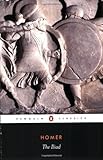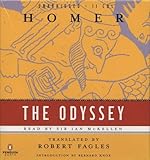|
|
Help |
| Home - Authors - Homer (Books) | |
e99 Online Shopping Mall
|
|
Help |
| Home - Authors - Homer (Books) | |
| Back | 21-40 of 101 | Next 20 |
click price to see details click image to enlarge click link to go to the store
| 21. The Iliad (Penguin Classics) by Homer | |
 | Paperback: 576
Pages
(2003-04-29)
list price: US$13.00 -- used & new: US$7.25 (price subject to change: see help) Asin: 0140447946 Average Customer Review: Canada | United Kingdom | Germany | France | Japan |
|
Editorial Review Product Description Customer Reviews (26)
| |
| 22. The Odyssey by Homer | |
 | Audio CD:
Pages
(2005-10-20)
list price: US$39.95 -- used & new: US$23.23 (price subject to change: see help) Asin: 014305824X Average Customer Review: Canada | United Kingdom | Germany | France | Japan |
|
Editorial Review Product Description Customer Reviews (21)
| |
| 23. The Golfing Machine by Homer Kelley | |
| Hardcover: 245
Pages
(2006-06-15)
list price: US$34.95 -- used & new: US$38.95 (price subject to change: see help) Asin: 0932890067 Average Customer Review: Canada | United Kingdom | Germany | France | Japan | |
Customer Reviews (30)
| |
| 24. Centerburg Tales: More Adventures of Homer Price by Robert McCloskey | |
 | Paperback: 191
Pages
(1977-10-27)
list price: US$6.99 -- used & new: US$2.95 (price subject to change: see help) Asin: 014031072X Average Customer Review: Canada | United Kingdom | Germany | France | Japan |
|
Editorial Review Product Description Customer Reviews (8)
"That character," said Freddy after a long silence, "could make some little squirrel very happy."
| |
| 25. Watercolors by Winslow Homer: The Color of Light (Art Institute of Chicago) by Martha Tedeschi, Kristi Dahm | |
 | Hardcover: 228
Pages
(2008-02-26)
list price: US$45.00 -- used & new: US$49.97 (price subject to change: see help) Asin: 0300119453 Average Customer Review: Canada | United Kingdom | Germany | France | Japan |
|
Editorial Review Product Description Customer Reviews (13)
| |
| 26. The Iliad (Penguin Classics Deluxe Edition) by Homer | |
 | Paperback: 704
Pages
(1998-11-01)
list price: US$17.00 -- used & new: US$9.71 (price subject to change: see help) Asin: 0140275363 Average Customer Review: Canada | United Kingdom | Germany | France | Japan |
|
Editorial Review Product Description Customer Reviews (150)
| |
| 27. Who Killed Homer: The Demise of Classical Education and the Recovery of Greek Wisdom by Victor Davis Hanson, John Heath | |
 | Paperback: 323
Pages
(2001-04-01)
list price: US$17.95 -- used & new: US$9.98 (price subject to change: see help) Asin: 1893554260 Average Customer Review: Canada | United Kingdom | Germany | France | Japan |
|
Editorial Review Product Description Why, at the end of the20th century, should we give a hoot in the first place about a brutal,misogynist society that rose to greatness on the back of slaves?Because, they argue, it was the first place; for all the faultsof ancient Greece, the seeds of what Western civilization is todaywere planted there. "What we mean by Greek wisdom," theyexplain, "is that at the very beginning of Western culture theGreeks provided a blueprint for an ordered and humane society thatcould transcend time and space, one whose spirit and core values couldevolve, sustain, and drive political reform and social change for ageshence." But Hanson and Heath are not content to simply make afiery, articulate case for what's right about understandingthis particular ancient civilization in a contemporary world wheremore and more non-Western societies openly seek to embrace thedemocratic spirit. They go on to launch a deliciously vituperativejeremiad on what's wrong with the priorities of those entrustedwith passing on this wisdom. Classics departments, as portrayed inWho Killed Homer?, appear to be filled with politicallycorrect, insecure footnote fawners who, steeped in minutiae, miss theBig Picture. Hanson and Heath have a plan, sure to raise the hacklesof tenured professors, for reviving classical studies that emphasizesthe importance of teaching, communicating, and popularizing overpublishing arcane monographs in journals not even the writer's familywill ever read, insisting that the alternative--the extinction of avivid intellectual pursuit--borders on cultural suicide. --JeffSilverman Customer Reviews (45)
| |
| 28. A History of Interest Rates, Fourth Edition (Wiley Finance) by SidneyHomer, Richard Sylla | |
 | Hardcover: 736
Pages
(2005-08-29)
list price: US$85.00 -- used & new: US$46.35 (price subject to change: see help) Asin: 0471732834 Average Customer Review: Canada | United Kingdom | Germany | France | Japan |
|
Editorial Review Product Description Customer Reviews (7)
| |
| 29. The Keeper's Son (Josh Thurlow Series #1) by Homer Hickam | |
 | Mass Market Paperback: 448
Pages
(2004-08-31)
list price: US$7.99 -- used & new: US$3.89 (price subject to change: see help) Asin: 0312999496 Average Customer Review: Canada | United Kingdom | Germany | France | Japan |
|
Editorial Review Product Description Customer Reviews (44)
| |
| 30. The Iliad of Homer by Andrew Lang, Homer, Walter Leaf | |
 | Paperback: 536
Pages
(2010-03-04)
list price: US$40.75 -- used & new: US$22.81 (price subject to change: see help) Asin: 1146487312 Average Customer Review: Canada | United Kingdom | Germany | France | Japan |
|
Editorial Review Product Description Customer Reviews (78)
| |
| 31. Sky of Stone: A Memoir by Homer Hickam | |
 | Mass Market Paperback: 409
Pages
(2002-10-29)
list price: US$7.99 -- used & new: US$3.75 (price subject to change: see help) Asin: 0440240921 Average Customer Review: Canada | United Kingdom | Germany | France | Japan |
|
Editorial Review Product Description Customer Reviews (45)
| |
| 32. The Children's Homer; The Adventures of Odysseus and the Tale of Troy by Padraic Colum | |
 | Paperback: 112
Pages
(2010-03)
list price: US$6.50 -- used & new: US$6.49 (price subject to change: see help) Asin: 1150888911 Average Customer Review: Canada | United Kingdom | Germany | France | Japan |
Customer Reviews (1)
| |
| 33. The Iliad: Volume II, Books 13-24 (Loeb Classical Library No. 171) by Homer | |
 | Hardcover: 672
Pages
(1925-01-01)
list price: US$24.00 -- used & new: US$19.20 (price subject to change: see help) Asin: 0674995805 Canada | United Kingdom | Germany | France | Japan |
|
Editorial Review Product Description | |
| 34. The Odyssey: Books 1-12 (The Loeb Classical Library, No 104) by Homer | |
 | Hardcover: 496
Pages
(1995)
list price: US$24.00 -- used & new: US$19.20 (price subject to change: see help) Asin: 0674995619 Average Customer Review: Canada | United Kingdom | Germany | France | Japan |
|
Editorial Review Product Description Here is a new Loeb Classical Library edition of the resplendent epic tale of Odysseus's long journey home from the Trojan War and the legendary temptations, delays, and perils he faced at every turn. Homer's classic poem features Odysseus's encounters with the beautiful nymph Calypso; the queenly but wily Circe; the Lotus-eaters, who fed his men their memory-stealing drug; the man-eating, one-eyed Cyclops; the Laestrygonian giants; the souls of the dead in Hades; the beguiling Sirens; the treacherous Scylla and Charybdis. Here, too, is the hero's faithful wife, Penelope, weaving a shroud by day and unraveling it by night, in order to thwart the numerous suitors attempting to take Odysseus's place. The works attributed to Homer include the two oldest and greatest European epic poems, the Odyssey and Iliad. These texts have long stood in the Loeb Classical Library with a faithful and literate prose translation by A. T. Murray. George Dimock now brings the Loeb's Odyssey up to date, with a rendering that retains Murray's admirable style but is worded for today's readers. The two-volume edition includes a new introduction, notes, and index. Customer Reviews (4)
Unfortunately, many of the translations that come alongside the Greek texts in the Loeb series are not particulalry faithful to the original text and are therefore useless if one is looking for a simple crib to help construe the meaning of this or that word or construction. Fortunately, the translation for the Loeb edition of the Odyssey is a great crib. It is, for the most part, painstakingly faithful to the Greek, although there are a few strange lapses here and there where the translator(s) have decided to add a few words that are not in the Greek. As for those who are Greekless and are simply looking for an accurate translation of the Odyssey, I'm not sure that I can recommend the translation. On the one hand, it is faithful to the sense of the text, but capture none of the sensuality of the text; that is to say, the rhythm and sound that make Homer so pleasurable are not reproduced in the translation. So, the translation is an excellent crib for construing the sense of Homer's text, but that's the extent of its merit.
| |
| 35. Travelling Heroes: In the Epic Age of Homer (Vintage) by Robin Lane Fox | |
 | Paperback: 496
Pages
(2010-03-09)
list price: US$17.00 -- used & new: US$9.99 (price subject to change: see help) Asin: 0679763864 Average Customer Review: Canada | United Kingdom | Germany | France | Japan |
|
Editorial Review Product Description Customer Reviews (5)
| |
| 36. The Adventures of Odysseus & The Tale of Troy: Homer's Great Epics, Rewritten for Children (Illustrated Hardcover) by Homer, Padraic Colum | |
 | Hardcover: 176
Pages
(2007-09-25)
list price: US$29.99 -- used & new: US$19.34 (price subject to change: see help) Asin: 1604500247 Average Customer Review: Canada | United Kingdom | Germany | France | Japan |
|
Editorial Review Product Description Customer Reviews (1)
| |
| 37. Winslow Homer: The Nature of Observation by Elizabeth Johns | |
 | Hardcover: 256
Pages
(2002-11-04)
list price: US$50.00 -- used & new: US$35.90 (price subject to change: see help) Asin: 0520227255 Average Customer Review: Canada | United Kingdom | Germany | France | Japan |
|
Editorial Review Product Description Customer Reviews (2)
| |
| 38. Winslow Homer in London: A New York Artist Abroad, 1881-1882 by David Tatham | |
 | Hardcover: 168
Pages
(2010-10-15)
list price: US$24.95 -- used & new: US$18.21 (price subject to change: see help) Asin: 0815609531 Canada | United Kingdom | Germany | France | Japan |
|
Editorial Review Product Description | |
| 39. The Greek Poets: Homer to the Present | |
 | Hardcover: 736
Pages
(2009-12-14)
list price: US$39.95 -- used & new: US$14.93 (price subject to change: see help) Asin: 0393060837 Average Customer Review: Canada | United Kingdom | Germany | France | Japan |
|
Editorial Review Product Description Customer Reviews (1)
| |
| 40. The Kid Who Only Hit Homers (Matt Christopher Sports Classics) by Matthew F Christopher | |
 | Paperback: 151
Pages
(1986-07-30)
list price: US$4.99 -- used & new: US$1.44 (price subject to change: see help) Asin: 0316139874 Average Customer Review: Canada | United Kingdom | Germany | France | Japan |
|
Editorial Review Product Description Customer Reviews (18)
| |
| Back | 21-40 of 101 | Next 20 |